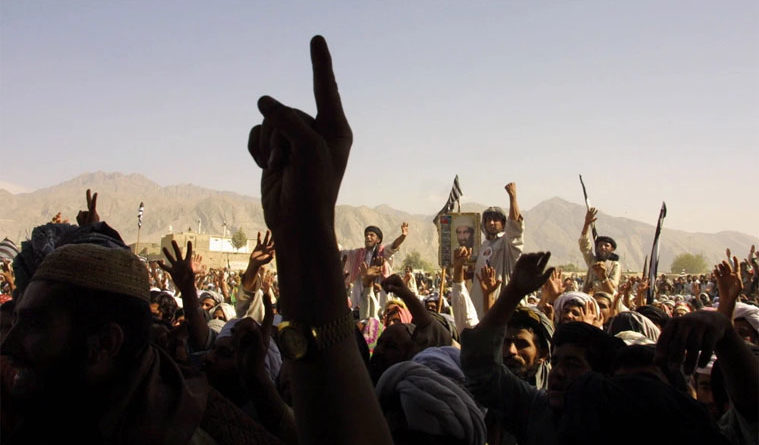Pakistan Might Soon Regret Its Win in Afghanistan
September 12, 2021
The Taliban’s takeover in Kabul has all the makings of a Pyrrhic victory. Thousands of Taliban supporters rallied October 1, 2001 in the town of Quetta, Pakistan.
Last weekend, Pakistan’s spy chief Faiz Hameed sipped tea at the Serena Hotel in Kabul as he mediated between Taliban ruling factions quarrelling over shares of power in the next Afghan government. “Everything will be okay,” he said about Afghanistan’s future. A few days later, a slate of men were appointed to high office, all of whom had been sheltered by the Pakistani state for nearly two decades while Pakistan denied doing any such thing.
Leaving Afghanistan
As Hameed helped select designated terrorists to be the country’s top leaders, he showed little concern for what the West would think of him. Instead, he marched around Kabul exuding the confidence of a victor. He and his colleagues are patting themselves on the back for pushing out India—one of the leading allies of the recently deposed Afghan government— and creating a client state in Afghanistan of their own.
Pakistan’s deep state has indeed secured the expanded strategic reach it so desperately craved against India and will almost certainly use the Afghan territory as a safe haven for anti-India terrorist groups, as it did the last time the Taliban were in power. Pakistan has also succeeded in proving its worth to the Chinese as a go-between and security guarantor. Beijing intends to mine minerals in the war-torn nation and spend billions of dollars building an economic corridor that runs through Pakistan and Afghanistan to Central Asia.
But what counts as an achievement for Pakistan’s political establishment may prove a tragedy for Pakistan’s people. There are growing reasons to worry about the security blowback from having an Islamic emirate next door. Meanwhile, the voices of those who seek the imposition of all-out sharia rule in Pakistan in emulation of the Taliban will become ever louder.
Decades of active Islamization has turned a large number of Pakistanis toward a more religious outlook, altering the social mores of a culturally diverse society. As the Taliban unleash their own particular brand of Islamism in Afghanistan, it’s inevitable that Pakistan will also become more radicalized.
Amir Rana, a Pakistani security analyst, said as more and more Pakistanis seek inspiration from the Taliban it might prove hard to combat narratives that propagate a more religious state and society. “The Taliban will become the sole source of inspiration for confused Pakistani youth,” he said. “Religious parties are already celebrating. It will Talibanize Pakistan further. The Taliban’s increasing popularity will also make other [non-Sunni] sects feel insecure. These tensions may exacerbate sectarian tensions,” and overall make society more intolerant.
The Taliban could well be an asset for Pakistan’s political establishment in its anti-India endeavors, but it’s doubtful the strategic benefits will extend much further. According to a Pakistani source who wished to remain anonymous, Pakistan may offer a base to the United States to take on the Islamic State-Khorasan, the terrorist group that most recently attacked Kabul airport and killed more than a hundred people, including 13 American soldiers. It is also trying to present itself as a mediator between the West and the Taliban, the interlocutor who can encourage the group to reform. But few in the West believe Pakistan’s promises any longer. Pakistan’s provision of sanctuary to the Taliban has soured its ties with the United States to such an extent that U.S. President Joe Biden has not called Pakistan’s Prime Minister Imran Khan even once since he replaced Donald Trump.
Moreover, there are signs that the Taliban might be less obsequious in following the orders of their prime patron that Pakistan expects, at least to maintain the pretense of independence in front of fellow Afghans. Pakistan is extremely unpopular in Afghanistan, and the Taliban are careful not to be seen as its puppets. They are already reluctant to concede to Pakistan’s core security issues when it comes to ending support for and handing over anti-Pakistan terrorists. “We are not Pakistan’s puppets, we are independent,” a Taliban leader told Foreign Policy from Kabul on condition of anonymity. “And yes, we have very good relations with Tehrik-i-Taliban Pakistan.”
Tehrik-i-Taliban Pakistan (TTP) members were trained and educated at the same religious seminaries that produced the Afghan Taliban. This group, however, was composed of Pashtun Islamists . It carried out some of the most horrific attacks against Pakistanis, even killing schoolchildren, and was eventually pushed by Pakistan’s armed forces into Afghanistan. But over the last year, as their Afghan contemporaries started the campaign to recapture Afghanistan, TTP’s attacks once again picked up. It carried out 32 attacks inside Pakistan in just the last month. TTP is evidence of the domestic blowback of Pakistan’s policies, yet independent experts fear that the generals see dead Pakistanis as mere collateral damage and have been reluctant to change their policy of proxy warfare.
(Anchal Vohra, is a columnist for Foreign Policy and a freelance TV correspondent and commentator on the Middle East based in Beirut.)
Courtesy: First Post

